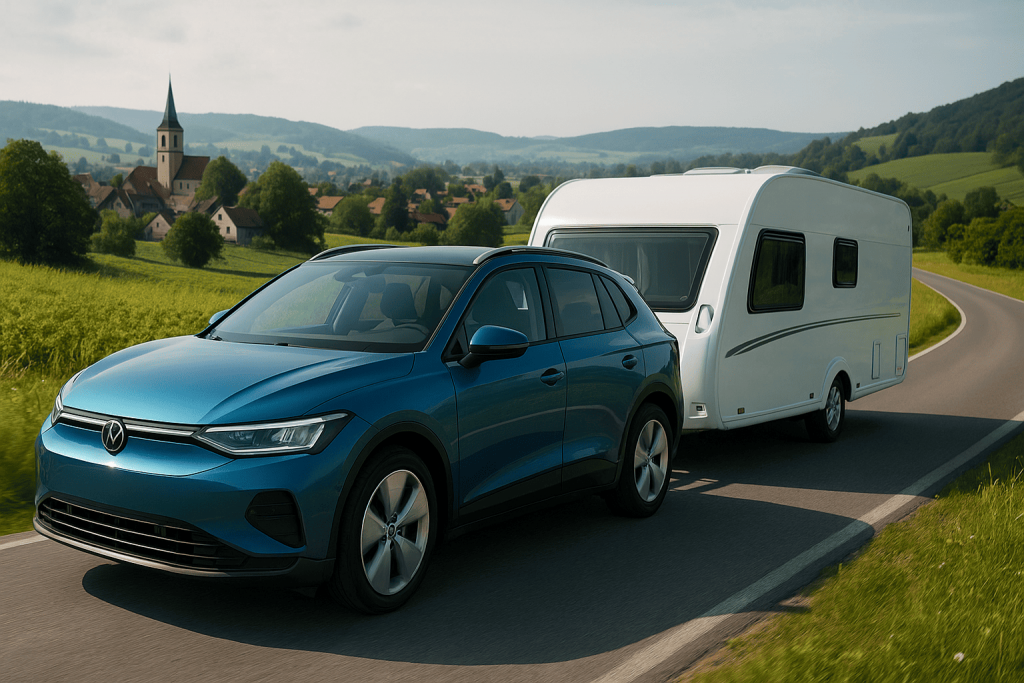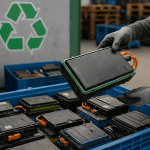Electric vehicles (EVs) are quickly becoming mainstream across Europe, praised for their efficiency, performance, and zero tailpipe emissions. But as more families and outdoor enthusiasts look to replace their combustion-engine cars with electric ones, a crucial question arises: can your EV tow a trailer? Whether it’s a compact camper, a bike rack, or a full-on caravan, the ability to tow opens new horizons—or exposes limitations. In this article, we unpack the reality of EV towing for camping adventures across Europe, from range impact to charging logistics, legal constraints, and smart solutions.
Torque Is No Problem—But Range Might Be
Unlike traditional gasoline cars, most EVs come with electric motors that deliver maximum torque instantly. This makes them surprisingly effective when it comes to towing. Acceleration remains smooth and controlled, and features like regenerative braking can help stabilize the vehicle on downhill slopes. However, the Achilles’ heel of EV towing is range. Even a small trailer can increase aerodynamic drag and weight significantly, reducing range by 20–50% depending on terrain and speed.
Towing-Capable EVs: What’s on the Market?
Not all EVs are rated for towing. Many early models, especially compact hatchbacks like the Renault Zoe or Nissan Leaf, either aren’t equipped with towing hardware or are legally restricted from towing anything at all. However, a growing number of EVs now offer strong towing capacity:
- Tesla Model Y Long Range: Up to 1,600 kg
- Kia EV6: Up to 1,600 kg
- Hyundai Ioniq 5: Up to 1,600 kg
- Volkswagen ID.4: Up to 1,200 kg
- BMW iX: Up to 2,500 kg
- Ford F-150 Lightning and Rivian R1T (limited EU availability): Over 4,000 kg
Before towing, always check your EV’s maximum braked and unbraked towing capacities, as well as whether the trailer hitch is approved by the manufacturer.
Legal Considerations: Weight, Speed, and Licenses
European regulations on towing are strict—and vary by country. In most EU states, standard category B licenses allow you to tow trailers up to 750 kg. Heavier combinations may require a B+E license. Speed limits while towing are also lower (typically 80–90 km/h on highways), which ironically helps conserve EV battery power. Make sure to consult local regulations, especially if crossing borders during your camping road trip.
Range Anxiety on the Road: Planning is Essential
Range loss when towing is real, but manageable with planning. Apps like A Better Routeplanner (ABRP) now allow you to input trailer weight and shape to calculate real-world range. Choosing campsites near high-power charging stations (such as Ionity or Tesla Superchargers) is a growing trend. Newer charging hubs are being designed with trailer-friendly bays, allowing you to charge without unhitching.
Charging with a Trailer: Practical Challenges
Not all charging stations are tow-friendly. Most public chargers—especially in urban areas—have tight parking layouts that make maneuvering with a trailer nearly impossible. That said, several solutions are emerging:
- Unhitching temporarily: Common, but time-consuming
- Dedicated towing bays: Found at select Ionity and Fastned locations
- Destination charging at campsites: Many European campsites offer 3.6–22 kW AC charging
Forward-thinking EV travelers often plan stops around trailer-compatible chargers and book campsites with charging amenities included.
Smart Trailers and Weight Reduction
A new generation of lightweight and EV-friendly camping trailers is emerging. Brands like Polydrops and Mink are designing ultra-aerodynamic, insulated micro-campers that minimize drag and weight. Even more revolutionary are electric trailers, which come with their own battery packs and powered wheels to offset the load. These “smart trailers” reduce the impact on the towing EV’s range and are already being piloted in Europe and North America.
Thermal Management: Another Hidden Hurdle
Towing a heavy load on long summer drives increases strain on the battery’s thermal system. Prolonged heat buildup can lead to power throttling or longer charging times. Some EVs, like those from Tesla and Hyundai, come with advanced battery conditioning systems to mitigate this. Still, it’s wise to factor in longer breaks and monitor battery temperatures via the onboard app when driving in hot climates.
Future Trends: Regulation and Infrastructure Evolution
The European Union is already adapting infrastructure and regulations to support EV towing. Pan-European green corridors are being developed with high-capacity charging and trailer-friendly designs. Some countries, like Norway and the Netherlands, lead in integrating EVs into outdoor lifestyles—offering specialized campsites, trailers, and road signs for EVs. As demand grows, more automakers will integrate towing capacity into their EV platforms as a standard feature.
Conclusion
Yes—your EV can tow a trailer. But whether it’s practical, comfortable, and range-efficient depends on your preparation, vehicle choice, and expectations. With the right model and a bit of planning, EV towing opens a new chapter for sustainable camping in Europe. From the fjords of Norway to the vineyards of southern France, the road is open to electric adventure—quiet, clean, and more connected than ever before.



ehh, hope the motor dont fry under all dat stress 🤔
Lol, for real, or the whole wirin gonna get all melty 😂
don’t it wear out the motor faster tho?🤔
Course it will! Them corps, they need you to be buyin new cars all the time.😎